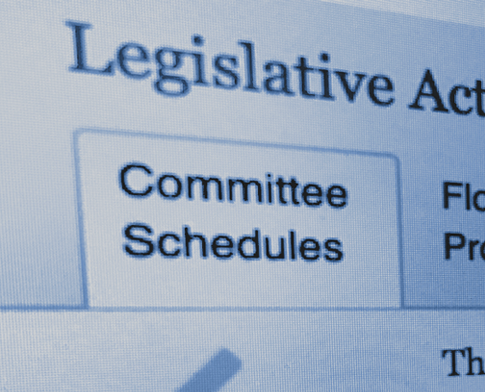Health Update (July 22)
It was another busy week with healthcare in Washington, as there were significant bills marked up in the House Energy & Commerce committee that included getting rid of surprise medical bills, providing more transparency in the drug pricing process, and Medicaid funding in the U.S. Territories. Additionally, there was significant movement in the administration, as it is expanding the definition of preventive care, continuing the opioid crisis battle, and highlighting numerous healthcare provisions as the forefront of the upcoming budget deadline.
House Energy & Commerce Markup
The House Energy & Commerce Committee Subcommittee on Health held a mark-up on Wednesday, July 17, during which it approved 26 bills. Most notably, the committee approved legislation to safeguard patients from “surprise” medical bills that included a last-minute compromise designed to win over members concerned the bill would favor insurers. The new approach would let either side appeal the federal benchmark payment to an arbiter in cases when the median in-network rate paid to doctors or hospitals exceeds $1,250. The surprise billing measure was rolled into a sprawling bill, H.R. 2328, that also includes funding for Medicare and public health programs, such as community health centers and the National Health Service Corps. It also would increase Medicaid funding for Puerto Rico and other U.S. territories and delay for two years a $4 billion payment cut for hospitals that care for a large portion of uninsured and Medicaid patients due to take effect Oct 1. Next steps for this proposal remain unclear. The Ways and Means and Education and Labor Committees are actively considering alternative policies on the topic of surprise medical bills, though they have yet to issue formal proposals. To read a more detailed summary of this hearing, click here.
House Energy & Commerce Hearing
The House Energy & Commerce Committee Subcommittee on Oversight & Investigations held a hearing on Tuesday, July 16, entitled “Oversight of Federal Efforts to Combat the Spread of Illicit Fentanyl.” The hearing aimed at tackling issues surrounding fentanyl, and its dangerous contribution to the nationwide Opioid Crisis in a bipartisan manner. Fentanyl has been a hot topic of late as the number of overdoses and deaths related to the drug have skyrocketed in recent years. The statistics of these overdoses and deaths were reiterated often throughout the hearing by Committee Members, who also sought out how to better garner information between federal agencies to better combat the issue. The main issues brought up by committee members involved questions surrounding the communication and sharing of information between agencies to fight the crisis. The witnesses from different agencies in the United States offered potential solutions to combating fentanyl and noted that they would continue to brief the committee on any upcoming issues forthcoming in terms of communication between agencies. To read a more detailed summary of this hearing, click here.
ACA News
“Cadillac Tax” Scrapped from ACA
The House overwhelmingly voted to repeal the ACA’s “Cadillac” tax this week, on expensive health plans, with a bipartisan majority. The 40 percent excise tax on employer-based plans was designed to rein in health care spending but drew fierce opposition from a broad coalition of groups that included employers and labor unions. Passed in 2010, the Cadillac tax is currently scheduled to take effect in 2022, though it has been delayed previously and has not yet taken effect. The Congressional Budget Office estimated scrapping the tax would cost approximately $197 billion through 2029. But the House circumvented that issue by passing the repeal under suspension of the rules, allowing it to advance the legislation without offsetting the cost. The House vote in support of repeal bill, H.R. 748, sponsored by Rep. Joe Courtney (D-CT) was 419-6. The Senate hasn’t taken action. Companion legislation, S. 684, has 42 co-sponsors split among both parties, but passage will likely be complicated by the need to find a way to pay for it. [1]
GAO Decision on ACA
With the ACA continuing to be near the top of the healthcare headlines recently, the Government Accountability Office (GAO) issued a decision this week that Congress has the option to overturn recent Trump administration guidance loosening restrictions on state Obamacare waivers. The Trump administration last fall issued guidance giving greater leeway for states to overhaul their individual insurance markets. However, GAO has determined the guidance amounts to a regulation, exposing it to a challenge under the Congressional Review Act, which lets a simple majority in both chambers overturn federal rules. Meanwhile, the Trump administration today took new steps to encourage states to pursue more sweeping reforms to the individual market through the state waivers under Section 1332 of the ACA. CMS issued concept papers on multiple waiver options and a checklist for states preparing applications. [2]
News out of the Administration
Trump Administration Expanding Preventive Care
The Trump administration is making it easier for millions of individuals enrolled in high-deductible health plans to purchase drugs and medical equipment for chronic conditions like asthma, hypertension and diabetes. Under guidance issued Wednesday (July 17) by the IRS, the administration is expanding the definition of preventive care to let patients enrolled in high-deductible plans with pre-tax health-savings accounts combat costly medical conditions without having to first pay off their deductibles. Patients with hypertension, for example, will be able to purchase a blood pressure monitor and diabetics will be able to get coverage for insulin without first having to pay down their deductible. Meeting a deductible provides a disincentive to proactively address costly medical conditions and can lead to bigger medical bills in the long run. [3]
Latest on the Budget
The White House asked Democrats late Thursday (July 19) to include in a budget deal Senate Democratic drug-pricing policies that would save the government $115 billion. The drug proposal likely includes policies being discussed in the Senate Finance Committee that would make drug makers pay back Medicare for price hikes higher than inflation and raise the rebate cap in Medicaid. Ranking Finance Democrat Ron Wyden (OR) is pushing the inflationary rebates in Medicare Part D and Part B, and Senate Finance Republicans have been skeptical of incorporating those rebates in Medicare Part D. The Trump administration, however, reportedly is open to the rebates, and sources say those rebates account for the brunt of the $115 billion in drug savings that the administration is proposing as part of a budget deal. GOP members of the Finance Committee have said they are waiting on a score from the Congressional Budget Office to determine whether they will support inflationary caps in Part D. An informal CBO score of the bill is expected within days, possibly Friday. However, the CBO is not obligated to publicly release those numbers. Also part of the $115 billion figure is a separate Finance provision to increase the Medicaid drug rebate cap from 100% of a drug’s average manufacturer price to 125% and remove the cap entirely for new drugs, according to sources following the negotiations. Democrats have not yet agreed to the $115 billion in offsets, which the Trump administration proposed as part of a larger package of around $574 billion in pay-for policies. [4]
Opioid Crisis
CMS Continues Opioid Battle
CMS announced this week that Medicare wants to start testing payment for acupuncture treatment for beneficiaries with chronic lower back pain, characterizing the decision as part of its effort to combat the opioid crisis. “Defeating our country’s epidemic of opioid addiction requires identifying all possible ways to treat the very real problem of chronic pain,” HHS Secretary Alex Azar said in a statement. CMS has been working with NIH to launch studies testing the effectiveness of acupuncture in treating lower back pain. The proposal is limited to beneficiaries at least 65 years old who are participating in clinical trials sponsored by NIH or CMS-approved studies. [5]
Opioid Trial
The first trial of a drugmaker accused of fueling the opioid crisis is in the hands of an Oklahoma judge after the state and Johnson & Johnson gave closing arguments Monday (July 15) in a case likely to have implications for hundreds of other lawsuits filed by cities, counties, tribes and hospitals. The Oklahoma litigation could be an unusual bellwether for the hundreds of other cases against opioid-makers, distributors and pharmacies that are being handled by a federal judge in Ohio. The first of those cases is slated to go to trial in October if no settlement is reached. [6]
References
[1] Demko, Paul. “House votes to scrap Obamacare’s “Cadillac Tax.” Politico Pro. 17 July 2019. https://subscriber.politicopro.com/article/2019/07/house-votes-to-scrap-obamacares-cadillac-tax-3593448
[2] Pradhan, Rachana. “Congress can undo Trump’s Obamacare waiver guidance, GAO says.” Politico Pro. 15 July 2019. https://subscriber.politicopro.com/article/2019/07/congress-can-undo-trumps-obamacare-waiver-guidance-gao-says-3583073
[3] Demko, Paul. “IRS redefines preventive care for health savings account holders.” Politico Pro. 17 July 2019. https://subscriber.politicopro.com/article/2019/07/irs-redefines-preventive-care-for-health-savings-account-holders-3598968
[4] Cohrs, Rachel. “White House Wants Inflation, Medicaid Drug Rebates In Budget Deal.” Inside Health Policy. 19 July 2019. https://insidehealthpolicy.com/daily-news/white-house-wants-inflation-medicaid-drug-rebates-budget-deal
[5] Demko, Paul. “To fight opioids, Medicare will pay for acupuncture treatment.” Politico Pro. 15 July 2019. https://subscriber.politicopro.com/article/2019/07/to-fight-opioids-medicare-will-pay-for-acupuncture-treatment-3583075
[6] Fortier, Jackie. “Pain Meds As Public Nuisance? Oklahoma Tests A Legal Strategy For Opioid Addiction.” NPR. 16 July 2019. https://www.npr.org/sections/health-shots/2019/07/16/741960008/pain-meds-as-public-nuisance-oklahoma-tests-a-legal-strategy-for-opioid-addictio
HOUSE.GOV
The Week Ahead
For the main events of the next week and more, go straight to the key events on the house.gov website.
SENATE.GOV
The Week Ahead
For the main events of the next week and more, go straight to the key events on the senate.gov website.


